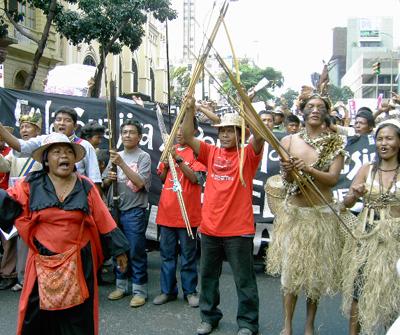From Our Daily Report
-
Masked men killed an indigenous activist from the Ngöbe-Buglé people after a protest against the Barro Blanco dam in Panama's western Chiriquí department.
-
Paramilitaries and state police are stepping up the harassment of residents resisting the construction of wind farms by foreign companies near Oaxaca's Pacific coast.
-
Sixty people were arrested as Chilean students marked the beginning of the school year with a new march against the privatized system left by Gen. Pinochet.
-
Unknown assailants killed the editor of what was once a prominent leftist weekly. Will this case join the list of unsolved murders of Haitian journalists?
VENEZUELA'S DEBT TO INDIGENOUS PEOPLES
What the Boliviarian Revolution Owes the Yukpa and Bari
by Sybila Tabra and Jorge Agurto, Servindi
Amid the homages that pay tribute to the late Hugo Chávez, we cannot forget the historical debt that the Venezuelan state has to the territorial claims of the Yukpa and Bari peoples, whose leader, Sabino Romero, was brutally assassinated March 3 by sicarios (hired killers) that respresent the interests of various sectors that occupy their ancestral territories.
TRANS-ATLANTIC PARTNERSHIP TRADE PACT
Duplicates Secretive Trans-Pacific Trade Pact
by Pete Dolack, Systemic Disorder
Neoliberalism knows no borders, so perhaps it should not come as a bolt out of the blue that the United States and European Union are set to negotiate a "Transatlantic Trade and Investment Partnership."
It might be thought that the Obama administration would have its hands full with the ongoing, top-secret Trans-Pacific Partnership talks, but it seems that much can be done in the absence of any pesky oversight. It might be thought that European Union officials would have their hands full with their series of financial crises, but it appears this is an irresistible opportunity to safeguard austerity.
PLANET EARTH: NUCLEAR-FREE ZONE
 by Karl Grossman, Common Dreams
by Karl Grossman, Common Dreams
With the second anniversary of the Fukushima Daiichi nuclear disaster this week, with North Korea having just threatened a "pre-emptive nuclear attack" against the United States and a US senator saying this would result in "suicide" for North Korea, with Iran suspected of moving to build nuclear weapons, with the continuing spread of nuclear technology globally, the future looks precarious as to humankind and the atom.
Can humanity at this rate make it through the 21st Century?
ANARCHISM AND THE ARAB UPRISINGS
An Interview with Mohammed Bamyeh
by Joshua Stephens, Toward Freedom
Spontaneity, largely horizontal organization, and a suspicion toward explicit political leadership have all been signature components of what's referred to as the Arab Spring. This has been the case since the outbreak of the Tunisian revolution—regardless of the regimes that have resulted from the power vacuums left in their wake. Yet very little of the particularities or the historical forces driving these uprisings captured the imagination of or spoke to left anti-authoritarians in the west, until the appearance of a western-style black bloc in Cairo on the two-year anniversary of the Egyptian revolution. That contradiction, and a sudden gaze cast—particularly on Egypt—pose rather unsettling questions about representation, and a slouch toward Orientalism.
MARX AND EXTRACTIVISM IN LATIN AMERICA
 by Joan Martínez Alier, EcoPortal.net
by Joan Martínez Alier, EcoPortal.net
President Rafael Correa of Ecuador asks when and where Marx criticizes mega-mining. In various interviews, Correa, the mouthpiece of mega-mining and the expansion of oil exploitation, has asked, "Let's see, señores marxistas, where was Marx opposed to the exploitation of non-renewable resources?" The response is easy. Marx and Engels criticized predatory capitalism, even if (in my opinion) we cannot make a proto-ecologist critique a fundamental pillar of their work, which was more focused in an analysis of the exploitation of salaried workers and its consequences for the dynamics of capitalism.
CAN VIGILANTE JUSTICE SAVE MEXICO?
 by Dudley Althaus, Global Post
by Dudley Althaus, Global Post
AYUTLA DE LOS LIBRES, Mexico — For almost a month now, hundreds of masked men wielding old shotguns, rifles, revolvers and machetes have claimed to be the law in the rugged mountains outside the faded resort of Acapulco.
Manning roadblocks and patrolling by the truckload, these citizen posses have been rounding up accused drug dealers, rapists, killers and rustlers under the wincing but winking watch of state and federal security forces.
TUNISIA ON RAZOR'S EDGE
After the Assassination of Chokri Belaid by Kevin Anderson, International Marxist-Humanists
by Kevin Anderson, International Marxist-Humanists
The assassination of leftist leader Chokri Belaid on February 6, apparently by Islamists, has brought into the open the long-simmering conflict that has pitted the ruling Islamist Ennahda Party against progressives, trade unionists, and secularists, who have staged the first general strike in 40 years and the largest street demonstrations since the 2011 revolution. – Editors
STRUGGLE FOR LAND AND WATER IN THE ANDES
Campesinos Stand Up to the Mineral Oligarchy
by Bill Weinberg, WIN Magazine
In what has become an emblematic struggle against government plans to open peasant lands to mineral interests throughout the sierras of Peru, local campesinos continue to hold strikes and protests in the northern region of Cajamarca—in defiance of a state of emergency and a heavy presence of army and National Police troops.
The months-long campaign to halt the mega-scale Conga gold mine high in Cajamarca's alpine zone—which Colorado-based Newmont Mining hopes to develop with Peruvian partners and investment from the World Bank—cost five lives last July 3 and 4, when government troops opened fire on protesters in the rural towns of Celendín and Bambamarca. The youngest of the fallen was only 17 years old.











Recent comments
1 day 5 hours ago
1 day 5 hours ago
1 day 6 hours ago
1 day 6 hours ago
2 days 4 hours ago
2 days 9 hours ago
3 days 1 hour ago
3 days 7 hours ago
3 days 9 hours ago
4 days 2 hours ago